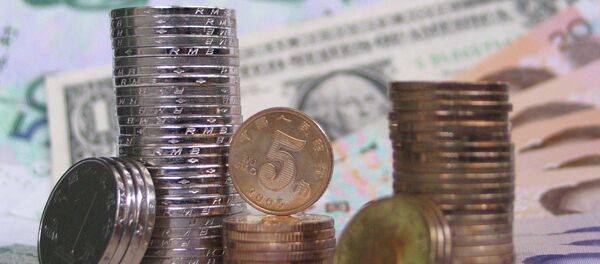Kristian Rouz — After the Greek concerns settled with the deal reached between Athens and its creditors, bond market volatility dropped dramatically across the globe, most importantly, in Europe. Nations of Southern Europe, most exposed to risks stirred by the lengthy Greek standoff, saw the greatest decline in government debt volatility, meaning an improved investment outlook. Adding to this first world optimism, emerging markets have experienced the greatest capital flight since 2009 in Q2, meaning a larger-scale influx of money liquidity into safer assets. That, makes the likes of Italy and Spain the indirect beneficiaries of the Greek deal.
The prospect of wild fluctuations in Europe's bond markets has narrowed with volatility in most prominent bonds having hit its lowest since early June after the Greek debt restructuring deal. The decisions made by the Greek and German national legislatures, allowing for new loans to be provided to Athens in exchange for austerity and broader economic reforms in the struggling nation, and the stabilization measures undertaken by the European Central Bank (ECB) have all triggered a retreat in yields on Spanish and Italian bonds.
Spain's governmental debt also appreciated, with the yield on the 10-year benchmark bond dropping 0.19% to 1.94%.
This activity in the European periphery bond markets is not only a consequence of a more optimistic market sentiment, but is also a result of market participants taking profits from the Greek relief rally, as well as interest and debt servicing payments, subsequently reinvesting their money.
Europe's benchmark fixed income paper, the 10-year Deutsche Bund, also gained in value with its yield dropping 0.11% to 0.79% and estimated volatility falling to its lowest since 1 June, at 6.4% on Friday. The three-year high of volatility in Deutsche Bunds stood at 9.5% on 14 May, at the very height of the Greek impasse.
Amidst secondary factors affecting the dynamics in the European bonds, were the strength of the US dollar and the widening capital flight from emerging markets due to exacerbating risks to financial stability in many developing nations.
Meanwhile, net outflow of investment capital from emerging markets has reached $120 bln in Q2, as estimated by the American bank JPMorgan Chase & Co., the greatest loss of money liquidity since 2009, fueled by the stock collapse in mainland China, the decline in commodity prices and also various political risks. Most of this money has flown into first-world assets providing safer and more profitable investment opportunities, and while the US is overpriced and expensive, Europe has become the prime destination.
The emerging longer-term trend with emerging markets losing capital is only a recent development, as in Q1 the developing nations managed to attract some $80 bln worth of investment. That said, as the third world financial situation deteriorates, the formerly troubled Southern Europe is more likely to capitalize on such global imbalances.



